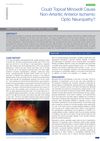 32 citations,
January 2019 in “American Journal of Clinical Dermatology”
32 citations,
January 2019 in “American Journal of Clinical Dermatology” Minoxidil helps treat eyebrow thinning, monilethrix, early hair loss, and shortens chemo-related hair loss.
 32 citations,
November 2011 in “International Journal of Dermatology”
32 citations,
November 2011 in “International Journal of Dermatology” Diagnose and manage CCCA with thorough history, exams, and labs; treat with anti-inflammatory agents, stress reduction, and stopping harmful hair practices.
 15 citations,
May 2004 in “Facial Plastic Surgery Clinics of North America”
15 citations,
May 2004 in “Facial Plastic Surgery Clinics of North America” Treat pattern hair loss with finasteride and topical minoxidil.
 15 citations,
July 1997 in “Clinics in Dermatology”
15 citations,
July 1997 in “Clinics in Dermatology” Traditional Chinese medications can cause skin reactions, and better testing and reporting are needed to identify allergens.
 11 citations,
December 2014 in “Clinical Obstetrics and Gynecology”
11 citations,
December 2014 in “Clinical Obstetrics and Gynecology” Obstetrician/gynecologists can diagnose and manage female hair loss with careful history taking and examination.
 6 citations,
January 2016 in “Journal of Clinical and Diagnostic Research”
6 citations,
January 2016 in “Journal of Clinical and Diagnostic Research” Topical minoxidil might potentially cause vision problems, but more research is needed.
 4 citations,
February 2022 in “Journal of Cosmetic Dermatology”
4 citations,
February 2022 in “Journal of Cosmetic Dermatology” Monocytes might be linked to hair loss after COVID-19.
 3 citations,
April 2019 in “Journal of Cosmetic Dermatology”
3 citations,
April 2019 in “Journal of Cosmetic Dermatology” Women's facial moisturizers cost more per ounce than men's.
 January 2022 in “Journal of Clinical and Diagnostic Research”
January 2022 in “Journal of Clinical and Diagnostic Research” Using platelet-rich plasma injections and biotin pills together significantly increases hair regrowth in men with hair loss.
 March 2020 in “Journal of Cosmetic Dermatology”
March 2020 in “Journal of Cosmetic Dermatology” Hair loss affects self-esteem; patients seek effective, low side-effect treatments.
 59 citations,
November 2018 in “Psychoneuroendocrinology”
59 citations,
November 2018 in “Psychoneuroendocrinology” Lower levels of certain brain chemicals are linked to worse PTSD symptoms in men.
 13 citations,
December 2017 in “Journal of Cosmetic and Laser Therapy”
13 citations,
December 2017 in “Journal of Cosmetic and Laser Therapy” Low-level laser therapy can stimulate hair growth more effectively than fake devices, but patient satisfaction is similar for both. Results should be taken with caution due to small study sizes and differences between studies. More research is needed.
 12 citations,
September 2018 in “Dermatologic Therapy”
12 citations,
September 2018 in “Dermatologic Therapy” Daily low-dose aspirin lowers minoxidil's effectiveness for hair loss treatment.
 2 citations,
September 2013 in “Journal of Cosmetic Dermatology”
2 citations,
September 2013 in “Journal of Cosmetic Dermatology” Hair restoration combines drugs and follicular unit grafting for natural, long-lasting results.
 October 2015 in “Elsevier eBooks”
October 2015 in “Elsevier eBooks” Minoxidil is effective for hair growth and safe for long-term use.
 151 citations,
May 2014 in “American Journal of Clinical Dermatology”
151 citations,
May 2014 in “American Journal of Clinical Dermatology” Effective treatments for male pattern baldness include oral finasteride and topical minoxidil, while topical minoxidil is best for female pattern baldness.
 37 citations,
January 1997 in “Clinics in Dermatology”
37 citations,
January 1997 in “Clinics in Dermatology” Hair problems are common and distressing for women, but increasing knowledge of treatments offers hope.
 16 citations,
June 2021 in “Journal of Dermatological Treatment”
16 citations,
June 2021 in “Journal of Dermatological Treatment” Minoxidil effectively treats hair loss, especially androgenetic alopecia, but needs more research for better understanding.
 12 citations,
May 2017 in “Medicine”
12 citations,
May 2017 in “Medicine” Oral isotretinoin was recommended for a 21-year-old woman with severe acne.
 4 citations,
September 2015 in “Case Reports”
4 citations,
September 2015 in “Case Reports” A man fainted and felt unwell after using a strong hair growth product, but got better when he stopped using it.
 1 citations,
March 2021 in “Current Dermatology Reports”
1 citations,
March 2021 in “Current Dermatology Reports” Various treatments help hair growth, but more research needed for safety and effectiveness.

Ingesting minoxidil can cause serious heart problems and requires urgent medical treatment.
 March 2024 in “Cleveland Clinic journal of medicine”
March 2024 in “Cleveland Clinic journal of medicine” Alpha-blockers and 5-alpha reductase inhibitors are main treatments for BPH, with new support for phosphodiesterase-5 inhibitors and beta-3 agonists.
 January 2024 in “International journal of homoeopathic sciences”
January 2024 in “International journal of homoeopathic sciences” Early intervention and patient education are crucial for managing alopecia areata.
 November 2023 in “Curēus”
November 2023 in “Curēus” Topical tretinoin effectively treated sebaceous filaments, improving skin appearance.
 June 2023 in “Historical records of Australian science/Historical Records of Australian Science”
June 2023 in “Historical records of Australian science/Historical Records of Australian Science” George Ernest Rogers was a notable scientist who made important discoveries about hair and wool proteins.
 103 citations,
June 2007 in “Endocrinology and Metabolism Clinics of North America”
103 citations,
June 2007 in “Endocrinology and Metabolism Clinics of North America” Male pattern hair loss is genetic and influenced by hormones, with treatments like minoxidil and surgery available.
 74 citations,
August 2006 in “Journal of clinical gastroenterology”
74 citations,
August 2006 in “Journal of clinical gastroenterology” Shen-Min, a hair growth supplement, likely caused acute hepatitis in a woman, improving after she stopped taking it.
 58 citations,
September 2012 in “Dermatologic Clinics”
58 citations,
September 2012 in “Dermatologic Clinics” Male pattern hair loss caused by follicular miniaturization; early diagnosis and treatment can reduce psychological burden.
 43 citations,
October 2002 in “International Journal of Cosmetic Science”
43 citations,
October 2002 in “International Journal of Cosmetic Science” All three shampoos reduced dandruff and hair loss, but ketoconazole and piroctone olamine also made hair thicker.






























